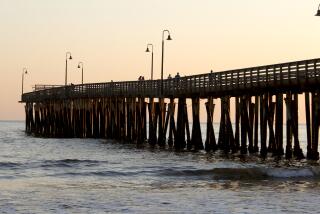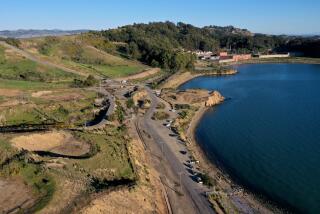State to Drop Plan for Crystal Cove Luxury Resort
State officials said Saturday that they intend to drop plans for a luxury resort at Crystal Cove State Park, recognizing the escalating effort to protect Southern Californiaâs last 1920s-era beach colony from upscale development.
The decision caps years of protests over the proposal and remains contingent on negotiations underway between the projectâs developer and the state, which intends to buy back the rights to the coastal land, located north of Laguna Beach.
âWe listened and it was clear the community does not want what they believe is a luxury resort,â Roy Stearns, deputy director of communications for California State Parks, said Saturday.
Park officials have asked developer Michael Freed and his associates at Crystal Cove Preservation Partners to tally up the cost of buying back the 60-year lease the state signed in 1997. The price could be as high as $2 million, Stearns said.
âThereâs a proposal on the table to terminate the [developerâs] contract,â he said. âBut we are still in negotiations. It would appear weâre close, but nothing has been signed yet. . . . I think thereâs a strong feeling we will have a solution here.â
Freed has been out of the country at a resort he co-developed in Fiji, and that has slowed the progress of negotiations, Stearns said. But State Parks Director Rusty Areias has been in phone and e-mail contact with the developer, the two speaking as recently as Friday.
Neither Areias nor Freed could be immediately reached Saturday. Freed has previously said he is open to a buyout, as long as the cottages inside the park are not torn down. Even if the buyout doesnât materialize, Stearns said, it remains unlikely that the resort will be built.
The stateâs announcement was cheered by activists who have been intent on stopping the project since its inception.
âThis is something weâve been working diligently on,â said Laura Davick, founder of the Alliance to Rescue Crystal Cove. âWeâre very thrilled.â
Controversy has festered about what to do with the coveâs village of 46 ramshackle cottages, which are listed on the National Register of Historic Places by virtue of their beach colony status. The original plan called for transforming the dwellings into hotel cabins that would rent for $375 a night.
At times, park officials have argued that the resort deal was necessary to finance $35 million worth of renovations and repairs to cottages, septic tanks and drainage systems. But over the years the state has gone back and forth over whether to back out of the resort plan.
There has even been opposition within the opposition, with factions disagreeing over whether the cottages should be razed or turned into an arts, education and science center, and whether current tenants should be allowed to stay.
Still, the project looked like a done deal until last month, when a rising chorus of discontent among village activists was ratcheted up by the high-profile voice of Irvine Ranch heiress Joan Irvine Smith.
A former director of the Irvine Co. and a noted philanthropist, Smith is the great-granddaughter of Orange County land baron James Irvine, whose original holdings of avocado groves, lima bean and alfalfa fields and grazing land stretched from the ocean to Cleveland National Forest. Her family sold the land that became Crystal Cove to the state in 1979.
Smith has said she wants the public land protected for the people of California, and she expressed her feelings to a feisty overflow crowd of 600 during an informational public meeting Jan. 18.
During her presentation, Smith roused the audience with her story of how her father, seeking to resolve a tax dispute, had tried to deed the land to the government for a federal park in 1931. But the deal was not finalized before his death in 1935, she said.
Park and development officials, who arranged the January meeting with the hope of winning the public over, instead began considering--once again--how to find a way out.
In a phone interview Saturday, Smith downplayed her role, giving credit to Gov. Gray Davis and his administration for getting involved.
âI didnât formulate this plan. It was brought to me, and I was just delighted with it,â she said, declining to offer specifics of the plan. âThe governor and his staff are working diligently on this, because itâs a good plan, and they want this Crystal Cove matter resolved.â
Although Crystal Coveâs long-term future remains unclear, park officials plan to proceed with infrastructure repairs and upgrades and other renovations outlined in a 1982 general plan.
âBeyond the buyout, I donât think weâve decided what the alternatives would be yet,â Stearns said. âWeâre basically separating the infrastructure issues from the long-term alternative thatâs chosen for the development of Crystal Cove.â
*
Times staff writer Deborah Schoch contributed to this story.
More to Read
Sign up for The Wild
Weâll help you find the best places to hike, bike and run, as well as the perfect silent spots for meditation and yoga.
You may occasionally receive promotional content from the Los Angeles Times.






